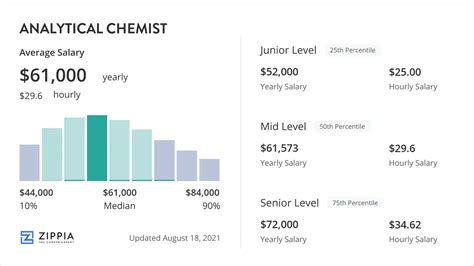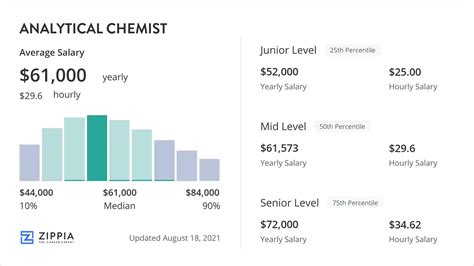A career as an analytical chemist places you at the heart of scientific discovery and quality control, from developing life-saving pharmaceuticals to ensuring the safety of our environment. But beyond the fascinating work, what is the financial outlook for this critical profession? The answer is promising. A skilled analytical chemist can expect a competitive salary that grows significantly with experience, education, and specialization, with typical earnings ranging from $60,000 for entry-level positions to well over $120,000 for senior experts.
This guide will provide a data-driven look into the salary of an analytical chemist in 2024. We'll break down the average compensation and explore the key factors that can maximize your earning potential in this dynamic and rewarding field.
What Does an Analytical Chemist Do?

Before diving into the numbers, it's essential to understand the role. Analytical chemists are scientific detectives. Their primary job is to determine the chemical composition and structure of substances. Using sophisticated instrumentation like mass spectrometers, chromatographs (HPLC, GC), and spectroscopes, they separate, identify, and quantify chemical components.
Their work is vital across countless industries:
- Pharmaceuticals: Ensuring a new drug has the correct active ingredient and is free from impurities.
- Environmental Science: Detecting and measuring pollutants in soil, water, and air.
- Food & Beverage: Verifying nutritional content and guaranteeing product safety.
- Forensics: Analyzing evidence from crime scenes.
- Manufacturing: Performing quality control on raw materials and finished products.
Average Analytical Chemist Salary

When looking at salary data, it's helpful to consult multiple sources to get a complete picture. The U.S. Bureau of Labor Statistics (BLS) groups analytical chemists under the broader category of "Chemists and Materials Scientists."
- According to the U.S. Bureau of Labor Statistics (BLS), the median annual wage for chemists was $80,670 as of May 2022. The lowest 10 percent earned less than $49,060, while the top 10 percent earned more than $138,580.
Salary aggregators that survey employees directly provide more specific data for the "Analytical Chemist" title:
- Salary.com reports that the median salary for an Analytical Chemist in the U.S. is approximately $78,410, with a typical range falling between $69,380 and $88,860.
- Glassdoor estimates the total pay for an analytical chemist to be around $75,500 per year, with a likely range between $62,000 and $96,000.
- Payscale places the average base salary at around $70,100 per year, showing a broad range from $53,000 to $98,000 depending on experience.
In summary, a mid-career analytical chemist can expect to earn a median salary in the range of $70,000 to $85,000 per year, with significant potential for growth on either side of that average.
Key Factors That Influence Salary

Your salary is not a static number. It's a dynamic figure influenced by several critical factors. Understanding these variables is the key to charting a successful and lucrative career path.
### Level of Education
Your academic credentials are the foundation of your career and have a direct impact on your starting salary and long-term potential.
- Bachelor's Degree (B.S.): A bachelor's in chemistry or a related field is the standard entry point for most analytical chemist positions, particularly in quality control (QC) or quality assurance (QA) labs. Graduates can expect to start in the $60,000 to $75,000 range.
- Master's Degree (M.S.): A master's degree signals advanced knowledge and research skills. It often qualifies you for roles with more responsibility, such as method development or leading small teams. It can increase starting salaries by $5,000 to $15,000 and accelerate your path to a mid-level or senior role.
- Doctorate (Ph.D.): A Ph.D. is typically required for high-level research and development (R&D) positions, principal scientist roles, and lab management. These positions command the highest salaries in the field, often starting at $90,000 or more and easily exceeding $120,000 to $150,000 with experience.
### Years of Experience
Experience is perhaps the single most significant driver of salary growth. As you gain hands-on expertise with different analytical techniques and instrumentation, your value to employers skyrockets.
- Entry-Level (0-2 years): Chemists in this stage are learning the ropes, mastering standard operating procedures (SOPs), and becoming proficient with core laboratory instruments. Salaries typically range from $60,000 to $75,000.
- Mid-Career (3-9 years): With several years of experience, you can troubleshoot complex instrument issues, develop or validate new analytical methods, and mentor junior chemists. Salaries often move into the $75,000 to $95,000 range.
- Senior/Experienced (10+ years): Senior analytical chemists are experts in their field. They may manage entire laboratory departments, serve as subject matter experts on complex projects, or lead critical R&D initiatives. Their salaries commonly range from $95,000 to $125,000+.
### Geographic Location
Where you work matters. Salaries for analytical chemists vary significantly by state and metropolitan area, largely due to the concentration of relevant industries (like biotech and pharmaceuticals) and the local cost of living.
According to BLS data, some of the top-paying states for chemists include:
- Maryland: Driven by federal agencies and a strong biotech corridor.
- New Jersey: A historical hub for the pharmaceutical and chemical industries.
- California: Home to major biotech clusters in the San Francisco Bay Area and San Diego.
- Massachusetts: Anchored by the world-renowned biotech and research ecosystem in Boston and Cambridge.
- Washington: A growing hub for biotech and life sciences.
Working in a major metropolitan area within these states will almost always yield a higher salary than a rural location, though it's important to balance that with the higher cost of living.
### Company Type
The type of organization you work for has a major impact on compensation and benefits.
- Large Private Industry (Pharma, Biotech, Oil & Gas): These companies are typically the highest-paying employers. They have significant resources and a critical need for top analytical talent for R&D and quality control.
- Government (FDA, EPA, National Labs): Federal government positions offer competitive salaries, excellent benefits, and strong job security, though the base pay may be slightly lower than in top-tier private industry.
- Contract Research Organizations (CROs): These organizations provide analytical services to other companies. Salaries can be competitive, but the work environment is often very fast-paced.
- Academia: University positions, while intellectually stimulating, generally offer lower salaries than industry roles, especially at the post-doctoral and staff scientist levels.
### Area of Specialization
Within analytical chemistry, certain specializations are in higher demand and can command premium salaries.
- Pharmaceutical Method Development & Validation: Experts who can create and validate robust analytical methods for new drug products are highly sought after.
- Mass Spectrometry (LC-MS/MS, GC-MS): Mastery of this complex and powerful technique is a high-value skill, particularly in proteomics, metabolomics, and trace-level analysis.
- Biopharmaceutical Analysis: With the rise of biologics (e.g., monoclonal antibodies), chemists who can characterize these large, complex molecules are in high demand.
- Regulatory Affairs/Compliance (cGMP): Chemists with a deep understanding of FDA regulations and Good Manufacturing Practices (GMP) are invaluable in the pharmaceutical and medical device industries.
Job Outlook

The future for analytical chemists is bright. The BLS projects that employment for chemists and materials scientists will grow by 6% from 2022 to 2032, which is faster than the average for all occupations.
This growth is fueled by an ongoing need for quality control in manufacturing, advances in pharmaceutical research, and an increased focus on environmental monitoring and protection. As scientific instrumentation becomes more powerful and complex, the demand for skilled professionals who can operate it effectively will remain strong.
Conclusion

A career as an analytical chemist offers a powerful combination of intellectual challenge, societal impact, and financial reward. While a starting salary in the $60,000s is a solid foundation, your long-term earning potential is firmly within your control.
To maximize your salary, focus on these key takeaways:
- Invest in Education: A Master's or Ph.D. opens doors to higher-paying leadership and R&D roles.
- Build Experience: Become an expert on high-demand instrumentation and techniques.
- Be Strategic About Location: Consider moving to an industry hub in states like California, Massachusetts, or New Jersey.
- Target High-Growth Industries: The pharmaceutical, biotech, and environmental sectors offer the most lucrative opportunities.
For those with a passion for precise measurement and scientific problem-solving, analytical chemistry is not just a job—it's a financially stable and deeply fulfilling career path with a clear runway for growth.
